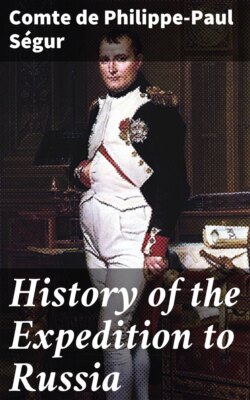Читать книгу History of the Expedition to Russia - comte de Philippe-Paul Ségur - Страница 24
На сайте Литреса книга снята с продажи.
ОглавлениеIt was reported at that time, that this monarch was led to expect the possession of the Russo-German provinces, which his troops were to be commissioned to invade. It is even affirmed that, after their conquest, he demanded their investiture from Napoleon. It has been added, but in vague terms, that Napoleon allowed the Prince-Royal of Prussia to aspire to the hand of one of his nieces. This was to be the remuneration for the services which Prussia was to render him in this new war. He promised, so he expressed himself, that he would go and sound her. It was thus that Frederick, by becoming the relation of Napoleon, would be enabled to preserve his diminished power; but proofs are wanting, to show that the idea of this marriage seduced the King of Prussia, as the hope of a similar alliance had seduced the Prince of Spain.
Such at that time was the submission of sovereigns to the power of Napoleon. It offers a striking example of the empire of necessity over all persons, and shows to what lengths the prospect of gain and the fear of loss will lead princes as well as private persons.
Meanwhile, Napoleon still waited the result of the negotiations of Lauriston and of Narbonne. He hoped to vanquish Alexander by the mere aspect of his united army, and, above all, by the menacing splendour of his residence at Dresden. He himself expressed this opinion, when, some days after, at Posen, he said to General Dessolles, "The assemblage at Dresden not having persuaded Alexander to make peace, it was now solely to be expected from war."
On that day he talked of nothing but his former victories. It seemed as if, doubtful of the future, he recurred to the past, and that he found it necessary to arm himself with all his most glorious recollections, in order to confront a peril of so great a magnitude. In fact, then, as since, he felt the necessity of deluding himself with the alleged weakness of his rival's character. As the period of so great an invasion approached, he hesitated in considering it as certain; for he no longer possessed the consciousness of his infallibility, nor that warlike assurance which the fire and energy of youth impart, nor that feeling of success which makes it certain.
In other respects, these parleys were not only attempts to preserve peace, but an additional ruse de guerre. By them he hoped to render the Russians either sufficiently negligent, to let themselves be surprised, dispersed, or, if united, sufficiently presumptuous to venture to wait his approach. In either case, the war would be finished by a coup-de-main, or by a victory. But Lauriston was not received. Narbonne, when he returned, stated, "that he had found the Russians in a state of mind as remote from dejection as from boasting. From their emperor's reply to him, it appeared that they preferred war to a dishonourable peace; that they would take care not to expose themselves to the hazards of a battle against too formidable an enemy; and that, in short, they were resolved on making every sacrifice, in order to spin out the war, and to baffle Napoleon."
This answer, which reached the emperor in the midst of the greatest display of his glory, was treated with contempt. To say the truth, I must add, that a great Russian nobleman had contributed to deceive him: either from mistaken views, or from artifice, this Muscovite had persuaded him, that his own sovereign would recede at the sight of difficulties, and be easily discouraged by reverses. Unfortunately, the remembrance of Alexander's obsequiousness to him at Tilsit and at Erfurt confirmed the French emperor in that fallacious opinion.
He remained till the 29th of May at Dresden, proud of the homage which he knew how to appreciate, exhibiting to Europe princes and kings, sprung from the most ancient families of Germany, forming a numerous court round a prince deriving all distinction from himself. He appeared to take a pleasure in multiplying the chances of the great game of fortune, as if to encircle with them, and render less extraordinary, that which placed him on the throne, and thus to accustom others as well as himself to them.
